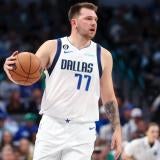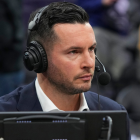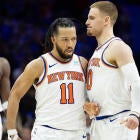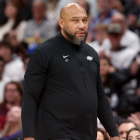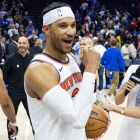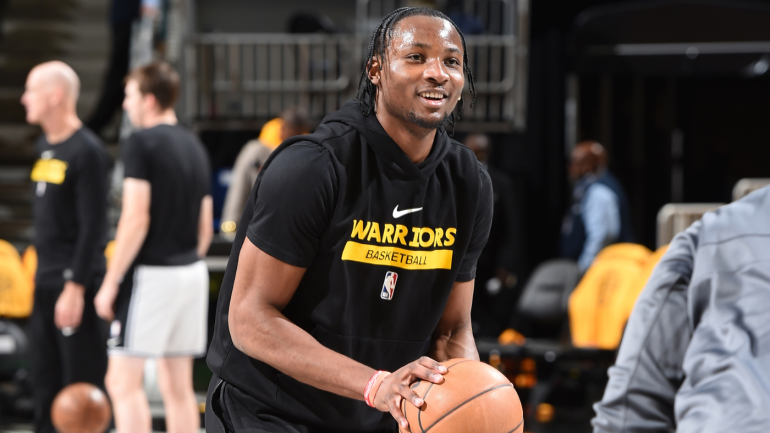
Jonathan Kuminga has been out of the Golden State Warriors' rotation lately, and the 20-year-old forward has found this "tough," he said in an interview with the San Francisco Chronicle's C.J. Holmes.
Kuminga, the No. 7 pick in the 2021 draft, averaged 9.9 points, 3.4 rebounds and 1.9 assists in 20.8 minutes this season, appearing in 67 games and starting in 16 of them. In the Warriors' first-round series against the Kings, he played 10 minutes in Game 1, four in Game 2, 13 in Game 3 and from then on appeared only in garbage time. He received a DNP-CD in Game 5 of that series and again in Golden State's series-opening loss against the Los Angeles Lakers on Tuesday.
From the San Francisco Chronicle:
"It's tough going through this season and being in (the game) most of the time and then things just flip out of nowhere without you knowing what's going on," Kuminga told The Chronicle.
…
"It's still tough to lock in every single time. It's still tough to smile every single time," Kuminga said. "But knowing where I've come from, seeing how many things that I've actually been through that a lot of people don't know that got me to this point… I feel like throughout my career, throughout my life, I've never been given anything. I've seen so many people just get handed stuff. That's never happened to me.
"When I was in high school I was definitely the No. 1 player, but it never got handed to me, I had to prove my point. … You can't stop the sun from shining, and at some point, the sun is going to come out. That's what keeps me ready every day."
Is this:
A) an honest answer about the challenges of being on the fringes of the rotation during the most important time of the season; or
B) an unnecessary complaint, particularly in terms of the "things just flip out of nowhere without you knowing what's going on" part, from a second-year player on a team with championship aspirations?
The answer is it's both, obviously, but if you were leaning toward B, it might be because you're aware of the speech about buy-in that Stephen Curry delivered to the team in advance of Game 7 against the Kings. Last Saturday, before the Warriors' film session, Curry addressed the "division they allowed to seep in," as The Athletic's Marcus Thompson and Shams Charania put it.
From The Athletic:
According to multiple sources in the private session, Curry told the team he believed in them, that they had enough to win. He asked for their trust in return. He assured them he could deliver victory if they all bought in. He implored them to put all of their feelings aside — which sources with knowledge of the locker room felt was messaging directed at [Jordan] Poole, Jonathan Kuminga and other guys who might've been unhappy for reasons such as playing time and role — and lock in to the unified mission. Anyone who wanted to remain in their emotions, he told them to stay home. Anyone who was ready for their vacation, he told them not to get on the bus for Sacramento. But anyone who did get on the bus, Curry took that as a signature of approval, a binding agreement to be on board with the mission. And if they did that, if they got on the bus, he promised he'd deliver. With his game, his faith, their solidarity, they'd win.
…
"You're in this space where you gon' fold or you gon' rise up," [Draymond] Green said, his voice raising with excitement as he relived the speech. "Once he did that, you have no choice but to rise up. He f—ing got everybody locked in. 'If you're getting on this bus, you're making a commitment to this team. No matter if you play zero minutes or 40 minutes. You're making a commitment to do whatever it takes."
At practice on Wednesday, Warriors coach Steve Kerr said that Kuminga "just has to stay ready" because the rotation could change as the series goes on, noting that veteran big man JaMychal Green was also out of the rotation during the Sacramento series but contributed in Game 1 against Los Angeles.
"You see the opportunity for JaMychal to play in a game like last night," Kerr said. "He stays ready, he comes out and knocks down a couple jumpers. That's what the playoffs are about. Every game is different, every series is different, and so it's on every player -- and I tell all our guys this -- to stay ready. Stay ready for whatever opportunity comes your way because injuries happen, matchups change. But it's not easy. It's not an easy job to all of a sudden get out there and play after sitting for a week or two."
The reason Kuminga is on the outside looking in is not some kind of mystery. It's spacing. While he shot a perfectly respectable 37% from 3-point range this year, he did it at low volume and the vast majority of his attempts were wide open. In March, Kerr said that Golden State avoids playing Kuminga at the small forward spot because opponents don't respect his shooting.
"Obviously with Draymond and [Kevon Looney] the paint is going to be crowded," Kerr said. "People are always going to pack the paint with the guys who are guarding those two, and a lot of teams will top-lock our guards and send them down into the paint. So that's why we've traditionally had another shooter out there."
Steve Kerr on Jonathan Kuminga: "What we have to determine is whether we can play him at the (small forward). For us, he's been pretty exclusively a (power forward)."
— Anthony Slater (@anthonyVslater) March 25, 2023
Spacing is the reason you don't see the Kuminga/Draymond/Looney lineup trio much. Full Kerr explanation here. pic.twitter.com/DIUtezsfG6
That has been precisely Los Angeles' defensive strategy against the Warriors, and its approach has been particularly extreme. In Game 1, the Lakers completely ignored Gary Payton II on the perimeter, surrendered open looks to JaMychal Green and even gave Andrew Wiggins a cushion.
This could be a long series, and there could be a place for Kuminga in it. If he plays, though, Kerr knows that Los Angeles won't guard him on the perimeter, so his minutes must come at the 4 or even as a smallball 5. Going into Game 2, Golden State is likely weighing how much it needs to use one-big lineups -- it went on a 14-0 run this way late in the opener -- and get more shooting on the court. Incorporating another player who doesn't space the floor is probably not the coaching staff's highest priority.










